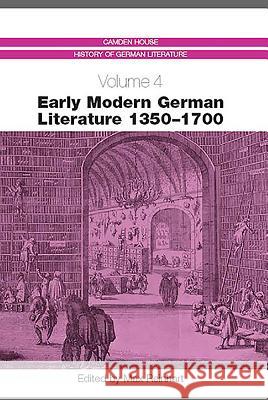Early Modern German Literature 1350-1700 » książka
Early Modern German Literature 1350-1700
ISBN-13: 9781571132475 / Angielski / Twarda / 2007 / 1148 str.
Early Modern German Literature provides an overview of major literary figures and works, socio-historical contexts, philosophical backgrounds, and cultural trends during the 350 years between the first flowering of northern humanism around 1350 and the rise of a distinctly middle-class, anti-classical aesthetics around 1700. Recent scholarship has significantly revised many traditional assumptions about the literature of this period, starting with a reassessment of the canon. The notion of -literature- has expanded to include a much wider range of texts than before, such as broadsheets, illustrated books, emblem books, travelogues, demonological treatises, and letters. Greater attention to the cultural and social phenomena that affect literary production has led to hitherto neglected areas of research, including the culture of learning and learnedness; the idea of authorship; the relationship between the intellectual elite and the state and other political authorities and institutions; the development of the family; gender dichotomy; and the early formation of an educated, urban middle class. In an introduction and twenty-seven essays on specific but broadly-based topics of seminal importance to the period, written by leading specialists from North America, the United Kingdom, and Germany, this pathbreaking volume reflects this state-of-the-art research. Contributors: Klaus Garber, Graeme Dunphy, Renate Born, Stephan Fussel, Scott Dixon, Wilhelm Kulmann, Max Reinhart, joachim Knape, Hans-Gert Roloff, Erika Rummel, John Alexander, Peter Hess, Andreas Solbach, Peter Daly, Helen Watanabe-O'Kelly, Jill Bepler, Gerhart Hoffmeister, Steven Saunders, jeffrey Chipps Smith, Wolfgang Neuber, Gerhild Scholz Williams, Anna Carrdus, John L. Flood, Laurel Carrington, Theodor Verweyen, John Roger Paas Max Reinhart is Professor of German at the University of Georgia.











